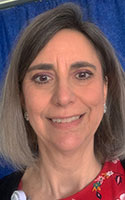She says she has seen many changes but the pandemic brings new challenges
By Megan Plete Postol

Sally Leahy has been a special education teacher for more than 30 years. In that time she has not only seen her students struggle, but she’s helped them learn to triumph over their obstacles.
She has been teaching at Poland Central School for 32 years. Before that, she taught at Franklin- Essex- Hamilton BOCES in Malone.
Throughout her three decades of experience, her industry has evolved quite a bit.
“It seems like everything has changed,” she said. “When I started my career, special education services were referred to as Option 1, Option 2, Option 3, Option 4, now they are called 12:1:1 [which means up to 12 students with 1 teacher and 1 teaching assistant]. Early in my career, students received all special education services outside the general education classroom. Now the focus is to look at the necessity of leaving the general education classroom for services. It is becoming more common for the special education teacher to support students in their general education classroom, which I find very helpful in most cases.”
Advancements have helped her students to adapt and thrive both in the classroom and beyond the classroom.
“With the changes in technology over time, there are better ways for students with disabilities to be more independent in a more natural way,” she said. “For example, Siri — just talk to her to dictate a reminder or to write an essay, or ask her the meaning of a word. Computers help anyone that is not a strong speller, to get the word spelled correctly. Computers also have features to read text to you, which are very helpful for a weak reader.”
Other changes Leahy has witnesses include societal viewpoints and the way students with disabilities are supported.
“Autism awareness, a designated time for awareness, and the symbol of the puzzle piece,” she said. “This is fantastic progress in acceptance of others.”
Unfortunately, though, sometimes Leahy still sees her students struggle with not always being accepted by others.
“There is still exclusion of people with disabilities, to varying degrees,” she said. “Sometimes it (a diagnosis) changes friendships among students, or incorrect conclusions are drawn. For example, a person that does not have normal speech articulation is considered to not have normal intelligence. This is not always the case, and these students, adults are excluded from opportunities.”
Leahy encourages her students to get involved in extracurricular endeavors.
“As a special educator, most of the students I work with struggle with academics,” she said. “They work very hard to earn passing grades, but sometimes, school is not a happy place for them, or it feels like a place where they do not feel smart. I’ve tried to encourage them to join activities where they can feel happy at school and contribute to a school event. Maybe it is being a part of a drama club performance, on stage or helping backstage, or joining an athletic team, or chorus/band, or Kids Against Pollution, Poverty, Prejudice (KAP).”
Leahy makes it a point to chaperone athletic games, help with drama productions, and volunteer as advisor for clubs where she will have an opportunity to see her students succeed, or as she says, “shine.”
Her favorite moments of her career have centered on developing bonds with her students’ families and sharing activities and events that are not based upon academics.
When one of her students needed a particular surgery to remove a tumor, she was able to build a connection to offer support.
“My student’s mother found a doctor in Texas that offered the most promising outcomes for the surgery,” Leahy said. “My aunt, uncle, and cousins lived near that hospital. They invited the family to church when they arrived in Texas before the surgery. This family was ‘adopted’ by my aunt, uncle, cousins’ church family. The pastor went to the hospital and prayed with the student’s family before surgery, they sent flowers and balloons and visited. While they were so far from their own family during a stressful time, I was able to make a connection for them so they felt like they had extended family around them during this stressful time. By the way, that student is healthy and has earned a college degree.”
COVID-19 has presented unique challenges to special education teachers over the past year, including Leahy.
“Learning virtually was challenging,” she said. “Many students I work with need verbal and non-verbal prompts to help them stay focused during instruction. Without being in the same room as them when learning virtually, it was very difficult to determine if they were on task or not, and my ‘little bag of tricks’ I use throughout the day, simply didn’t work as well virtually.”
Leahy’s husband is a retired technology education teacher from Adirondack Central School. She has two adult children, Patrick and Kaitlyn. Patrick and his wife, Reba, live in Rotterdam, and Kaitlyn and her husband, Sean, live in Derry, New Hampshire.
Outside of work, Leahy stays active. She enjoys camping, quilting, kayaking, boating, snowmobiling, snowshoeing, and she also serves as an adviser to the New York State American Baptist Youth Cabinet.

